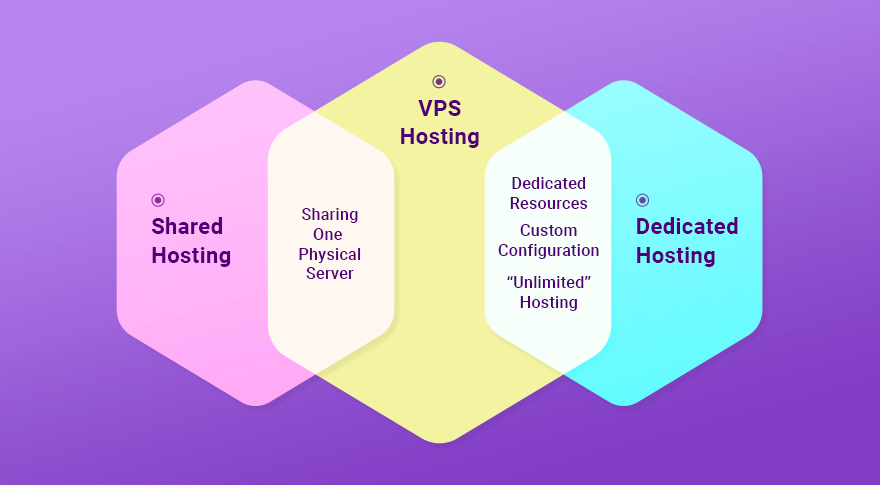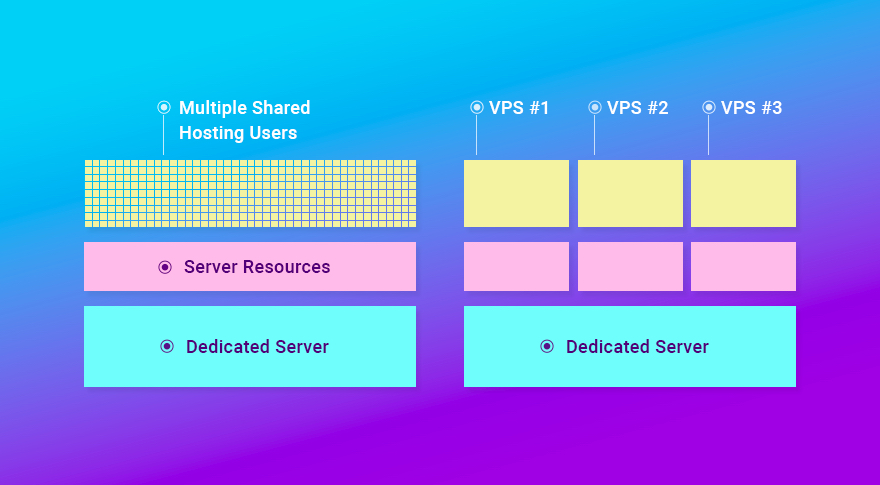Is your website experiencing a traffic spike that has caused your server to respond with error messages? Or maybe your shared server takes a really long time to load. If yes, then it’s time to start looking out for better server options.
One excellent hosting option that delivers better service than shared hosting, and costs less than dedicated servers is VPS hosting.
VPS hosting is mid-way between shared hosting and dedicated hosting, which makes it a perfect hosting for small-scale business websites.
What is VPS hosting?
VPS stands for Virtual Private Server. It is a hosting service that provides you with a dedicated server space on a shared physical computer.
VPS hosting optimizes the use of a server by creating multiple virtual servers on the same server. This process is called virtualization. This helps to provide dedicated server resources to various service users.

How does VPS hosting work?
VPS hosting or virtualization is made possible by the use of a hypervisor. The hypervisor functions to create virtual machines that create virtual versions of operating systems on the existing OS of the server.
The hypervisor divides the original server into partitions and allows each virtual machine to run their separate OS. With this, the server effectively shares its memory, processor, network bandwidth, and other features, among the virtual systems.
Server virtualization creates independent server compartments called containers. Each container has the server software that allows it to function as a dedicated server. All the dedicated servers that share the resources from the host server are referred to as the node.

Comparison of VPS with Other Forms of Hosting
As mentioned earlier, VPS hosting delivers better service than shared hosting, and costs less than dedicated servers. Let’s have a comparison of VPS hosting with other hosting services to understand how it’s better.
VPS Hosting vs Shared Hosting
In a shared server facility, the server resources are utilized by several websites being hosted on the same server. With shared hosting, you share your site server with other website owners, as stipulated by your hosting company.
The websites hosted on a shared server have to compete for the available resources. This means that the usage of one site affects the other sites. In terms of memory space and network bandwidth, your website would be altered based on the usage capabilities of other users.
VPS hosting, on the other hand, allows you to choose your OS. This means that you get dedicated resources from the shared server.
This provides your website with the liberty to use the allocated server resources optimally without being affected by the activities of a foreign website.
With shared hosting, the server is managed by the hosting company. However, with VPS hosting, you get full root access to manage your server as you see fit. VPS generally helps your website get dedicated control while using the same server as other users.
VPS Hosting vs Dedicated Hosting
In dedicated hosting, a whole server is rented out for use by only one website. This means that you get a fast, adaptable, and customizable server for your website.
VPS hosted server is not as flexible, fast or customizable as a dedicated server. The server features of VPS are a fraction of what you get by using the whole server.
This implies that dedicated server is best suited for websites that have high traffic as opposed the medium traffic VPS hosting is best suited for.
However, dedicated server hosting comes at a significantly higher price than VPS hosting. Not only this, the maintenance of dedicated servers is entirely up to the owners. Hence, there is a high cost of support, and a level of technical expertise is required.
VPS Hosting vs Cloud Hosting
Another hosting plan that website owners subscribe to is cloud hosting. Cloud hosting uses several virtual servers combined via the web. Hence, your website resources are shared amongst several physical computers.
Cloud hosting provides a form of dedicated server hosting just as VPS hosting. The main difference is that with cloud hosting, your server resources are much more than with VPS hosting.
This can come in handy when there is a surge in traffic. Also, you can be sure that your website would experience as limited downtime as possible.
With cloud hosting, you get a highly scalable, faster, and high-performing website. However, VPS offers better customization as well as firmer security. This is because the cloud servers are linked by the web and would, therefore, be more prone to attack.
One great thing is that your VPS hosting can be easily combined into a cloud hosting to give improved performance.
Benefits of VPS Hosting
Several advantages come with hosting your website on a virtual server. These include:
- You get dedicated features from a server at a lower price compared to dedicated servers
- VPS offers faster service than shared hosting servers
- You can choose which OS you want to run your server on
- You get to customize your server to suit your website needs
- There is no inconsistency in the available resources for your server
- You can scale better using VPS service than with shared hosting service
- You get better security and privacy, as your website files are kept apart from other server users.
VPS Server Management Options
VPS server management requires a level of technicality. This is because the server owner is responsible for running and maintaining the server as opposed to the general server maintenance in shared hosting.
Tasks like server configuration, security upgrades, software updates, and many more root access tasks must be regularly carried out on your server. To perform these tasks, you need to have background knowledge about how servers work.
The default VPS management option explained here is referred to as Unmanaged VPS. Luckily, if you can’t handle the technical detail needed for your VPS server, you can subscribe to the managed VPS option provided by hosting companies.
A peculiarity for both management options is the maintenance of the programs running on the server. So, either way, you need to get accustomed to the setup of a server before subscribing to VPS hosting. You should make sure to get a technical person that can handle your website needs for you.
Types of VPS Hosting
There are two types of VPS hosting on the basis of the responsibility of the web hosting company, these are managed VPS and unmanaged VPS. Let’s understand the basics of both.
1. Unmanaged VPS
The unmanaged VPS option is one in which the web hosting company only sees the installation of your server software. All other responsibilities to get your site up and running are passed over to you as the site owner.
You have to handle setting up the server control panel, installing software updates, and security patches. How well your website runs is left in your control. This is great for you if your site has specific settings that would enhance its smooth running.
Alongside this, you are saddled with the responsibility of handling security threats, fixing error popups, setting up backup services for your site, and monitoring your site performance.
In general, you need to have an excellent technical background of site maintenance or have a technical person that would do so for you, before you subscribe to this option. This is because you get little or no support from your host in case of outages.
2. Managed VPS
This is a more straightforward option for site owners who want less technical control of their website servers. Their only concern is to get their site up and to provide responses to the needs of visitors.
Your website hosting service provider is responsible for handling the technical details required for upkeeping your server.
They would handle the installation of software, setting up the control panel, installation of applications, and software updates.
The necessary security needs of your sites are also catered by the server managers. Not only this, but they also put monitors in place to help detect hardware failure and security threats. They also provide backups for your site files.

When to upgrade to VPS and how to decide when to upgrade?
Here are some tips to help you decide as a site owner when it’s time to upgrade your server to a VPS server.
- Traffic increase and slow loading speed
If the number of your site users increases significantly, a shared hosting facility might prove inadequate to accommodate your site needs. Then, you should consider upgrading to a virtual hosted server.
One easy way to know when your site is no longer compatible with a shared server is when your site load time takes much longer than it ought to. Once you notice this, you should take it as a clue to improve it to an independent server.
- For security and privacy
If you own a medium-scale site that houses confidential data, you might want to consider going with VPS hosting. Or maybe you provide services that require a reasonable level of security and privacy, like an eCommerce site.
VPS hosting offers you an option more secure than a shared server. You get to customize your site security features to suit your business needs better.
- Low memory space on the shared server
When your site becomes laden with files and data, it might lead to load time lagging. In some cases, loading errors like the 503 server error might start to pop up when your site information is requested from your server. To get rid of this, you can upgrade your site from a shared server to a VPS server.
- Access to customization effects
If the standard settings your host provider for your shared server does not favor your website functionality. Then it’s time to upgrade to a VPS hosting plan that would give full root access to configure your site better.
Conclusion
VPS hosting is perfect for websites that have outgrown the facilities that a shared hosting server offers. But they are yet to garner the peculiarities required for renting out a whole dedicated server.
VPS hosting is fast, secure, and reasonably affordable. It is the best plan for you as a start-up business that is expecting to receive heavy online traffic.




